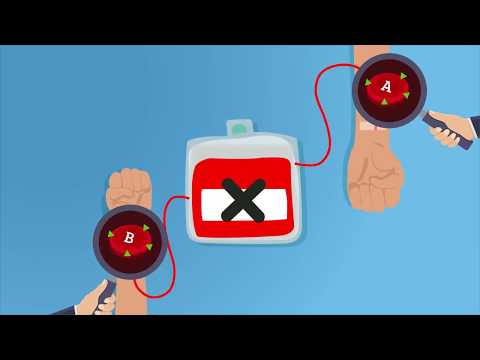A micro-lab on a chip detects blood type within minutes

There are four major blood types—O, A, B, and AB. These types differ based on the presence or absence of structures called A antigens and B antigens on the surfaces of red blood cells. Blood can be further divided into positive and negative types based on the presence or absence of D antigens on red blood cells. Medical professionals usually tell a patient’s blood type with tests involving antibodies against the A and B antigens. When antibodies recognize the corresponding antigens, they bind to them, causing the blood cells to clump together and the blood to coagulate. Thus, specific antigen-antibody combinations tell us what the blood type of a blood sample is.
Yet, while the concept sounds straightforward, the equipment and techniques required are often very specialized. Tests, therefore, are non-portable, have high personnel cost, and can take over half an hour to yield results. This can prove problematic in several types of emergency situations.
Aiming to solve these problems, a team of scientists at Japan’s Tokyo University of Science, led by Dr Ken Yamamoto and Dr Masahiro Motosuke, has developed a fully automated chip that can quickly and reliably determine a patient’s blood type. In the words of Dr Motosuke, he and his colleagues “have developed a compact and rapid blood-typing chip which also dilutes whole blood automatically.”
The chip contains a micro-sized “laboratory” with various compartments through which the blood sample travels in sequence and is processed until results are obtained. To start the process, a user simply inserts a small amount of blood, presses a button, and waits for the result. Inside the chip, the blood is first diluted with a saline solution and air bubbles are introduced to promote mixing. The diluted blood is transported to a homogenizer where further mixing, driven by more intensely moving bubbles, yields a uniform solution. Portions of the homogenized blood solution are introduced into four different detector chambers. Two chambers each contain reagents that can detect either A antigens or B antigens. A third chamber contains reagents that detect D antigens and a fourth chamber contains only saline solution, with no reagent, and serves as a negative control chamber in which the user should not observe any results. Antigen-antibody reaction will cause blood to coagulate, and by looking at which chambers have coagulated blood, the user can tell the blood type and whether the blood is positive or negative.
Further, the user does not require specialized optical equipment to read the results. The design of the detector chambers allows the easy identification of coagulated blood with the naked eye. The device is also highly sensitive and can even detect weak coagulation.
During testing, the research team screened blood samples from 10 donors and obtained accurate results for all 10 samples. The time needed to determine a single sample’s blood type was only five minutes.
Reflecting on the potential benefits of his team’s invention, Dr Motosuke remarks, “The advancement of simple and quick blood test chip technologies will lead to the simplification of medical care in emergency situations and will greatly reduce costs and the necessary labor on parts of medical staff.” Given the highly portable nature of the chip, Professor Motosuke also speculates that it could be used during aerial medical transport and in disaster response settings. This is a chip that has the potential to change the way emergency medical support is given.
Reference
Title of original paper: Fully-automatic blood-typing chip exploiting bubbles for quick dilution and detection
Journal: Biomicrofluidics
DOI: 10.1063/5.0006264
About the Tokyo University of Science
Tokyo University of Science (TUS) is a well-known and respected university, and the largest science-specialized private research university in Japan, with four campuses in central Tokyo and its suburbs and in Hokkaido. Established in 1881, the university has continually contributed to Japan’s development in science through inculcating the love for science in researchers, technicians, and educators.
With a mission of “Creating science and technology for the harmonious development of nature, human beings, and society”, TUS has undertaken a wide range of research from basic to applied science. TUS has embraced a multidisciplinary approach to research and undertaken intensive study in some of today’s most vital fields. TUS is a meritocracy where the best in science is recognized and nurtured. It is the only private university in Japan that has produced a Nobel Prize winner and the only private university in Asia to produce Nobel Prize winners within the natural sciences field.
About Dr Masahiro Motosuke from Tokyo University of Science
Dr Masahiro Motosuke is an Associate Professor in the Department of Mechanical Engineering at the Tokyo University of Science. He earned a PhD in Engineering from Keio University, and he has held positions at the Japan Society for the Promotion of Science and the Technical University of Denmark. His research into thermofluidics and thermofluidics-based sensors has resulted in 168 journal articles, conference papers and book chapters since 2003. He has received multiple awards for his research from professional organizations such as the Heat Transfer Society of Japan.
Funding information
This research was supported by JSPS KAKENHI Grant Number JP16K18033.
Media contact
Tsutomu Shimizu
Email: mediaoffice@admin.tus.ac.jp


